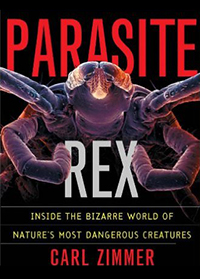 I’ve always been fascinated by parasitism. Parasites are organisms that live on or in another organism (or organisms) in a way that detracts from the vitality of the host. Nothing in nature is redder in tooth and claw than the parasite. They represent a stark repudiation of the naive way many people think of evolution, with humans at the pinnacle, with a historical sense of purpose or progress, and with the morality that might imply. Parasites live in highly specialized ways, and they harm they leave in their wake is more personally palpable as a result. They exist, as we all do, to propagate their genes to the next generation, and the destruction they cause along that path can be macabre and fascinating. As Charles Darwin put it in a letter to Asa Gray,
I’ve always been fascinated by parasitism. Parasites are organisms that live on or in another organism (or organisms) in a way that detracts from the vitality of the host. Nothing in nature is redder in tooth and claw than the parasite. They represent a stark repudiation of the naive way many people think of evolution, with humans at the pinnacle, with a historical sense of purpose or progress, and with the morality that might imply. Parasites live in highly specialized ways, and they harm they leave in their wake is more personally palpable as a result. They exist, as we all do, to propagate their genes to the next generation, and the destruction they cause along that path can be macabre and fascinating. As Charles Darwin put it in a letter to Asa Gray,
I cannot persuade myself that a beneficent & omnipotent God would have designedly created the Ichneumonidae with the express intention of their feeding within the living bodies of caterpillars, or that a cat should play with mice.
The ichneumons Darwin refers to are wasps that sting caterpillars (or spiders, depending on the species) to paralyze them. They stash the living but still bodies in secret burrows or chambers, and lay an egg or a dozen on them. The wasp larvae hatch and eat the host alive, saving the vital organs for last so the meat is fresh. Imagine being paralyzed and eaten alive, feeling those hungry grubs chewing away at your flesh and being unable to do anything about it, until finally, when your bodily larder is emptied, you’ve outlived your usefulness to them, and they burst through your skin to live out their destiny. It’s a horror show, and it shows decisively that natural organisms don’t exist as exemplars of moral purpose. They don’t live to comfort us. They exist to reproduce, and if they have to go through you to do it, they will.
There are even nematodes that parasitize the parasitic wasps, and other parasitic wasps that protect their conquered caterpillar by hatching two varieties of offspring: (1) reproductively viable individuals, and (2) others that basically exist only as booby-traps to kill other species of parasitic wasps that might happen upon the caterpillar smorgasbord post-paralyzation. The body of a caterpillar is a brutal battleground. It’s fascinating the learn about.
Lucky for us that Carl Zimmer has written the book Parasite Rex (2000), a survey of all things parasitic. Like everything Zimmer touches, it’s awesome science and awesome writing, leavened with a bit of personal anecdote and humor. I really enjoyed it. Chapters examine the societal (mis)appropriation of parasites as a political analogy, the relationship of parasites and the immune system, how parasites can drive evolutionary change, and parasites’ social and economic effects on humanity. Along the way, we get insights into the detailed physiology and biochemistry of dozens of parasitic organisms and profiles of the scientists who study them. One surprising point the book makes in an excellent and convincing way is that parasites can have beneficial effects on a host organism, and even to the functioning of an ecosystem.
Did you know that Plasmodium vivax (the little protozoan that causes malaria) and intestinal worms together rob humanity of 80 million “life-years” annually? Did you know that parasites are the majority of species on Earth? Did you know that some parasites take control of their hosts’ sex lives, castrating some and performing sex-changes on others? Dig into the deep ecology of Wolbachia and its peers by reading Parasite Rex, and feel your jaw drop in horrified wonder.
